
If you’ve been considering selling your home and have completed some preliminary research as to what the process is, you may have come across the term “virtual staging” and wondered “What is virtual staging?”. I have put together this blog post in order to help you understand what virtual stating is along with the pros and cons of this staging method so you can decide if it is right for your home.
When selling or leasing a home, it’s important to make sure that it looks as appealing as possible to potential buyers or tenants. One way to do this is by using virtual staging. Virtual staging is the process of adding or removing furniture and other objects from an image in order to create a more appealing visual. This can be done for photos of individual rooms or for entire home, both inside and outside.
If you’re thinking about virtually staging your home for sale, there are a few things to keep in mind. First, you’ll want to make sure that the furniture you use is in line with the overall style of the home. Second, you’ll want to choose pieces that are neutral in colour and design. This will help potential buyers or tenants visualize themselves living in the space. Finally, you’ll want to make sure that the furniture is arranged in a way that makes sense for the room.
Below are the pros and cons of virtual staging.
Pros:
Cons:
In order to help you visualize what virtual staging is, I have included some before and after photos below of a space that my team of stagers and I recently virtually staged for landlord clients of mine for their investment property. As you will be able to see from the photos, the virtually staged photos provide a sense of how the space can look with furniture. The best part about this process is that it simply involves taking professional photos and my virtual stager’s time to put everything together using their virtual staging software.
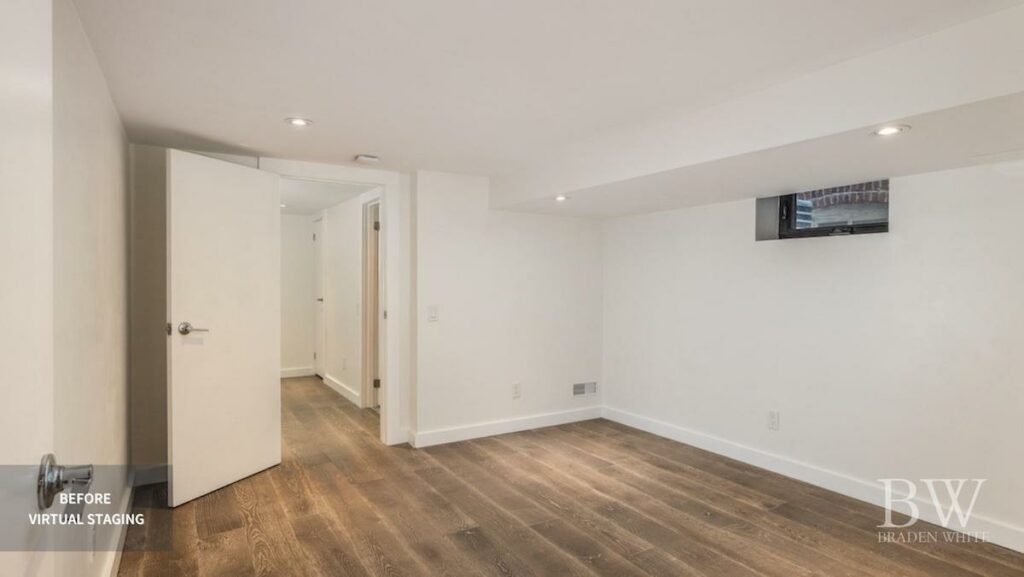

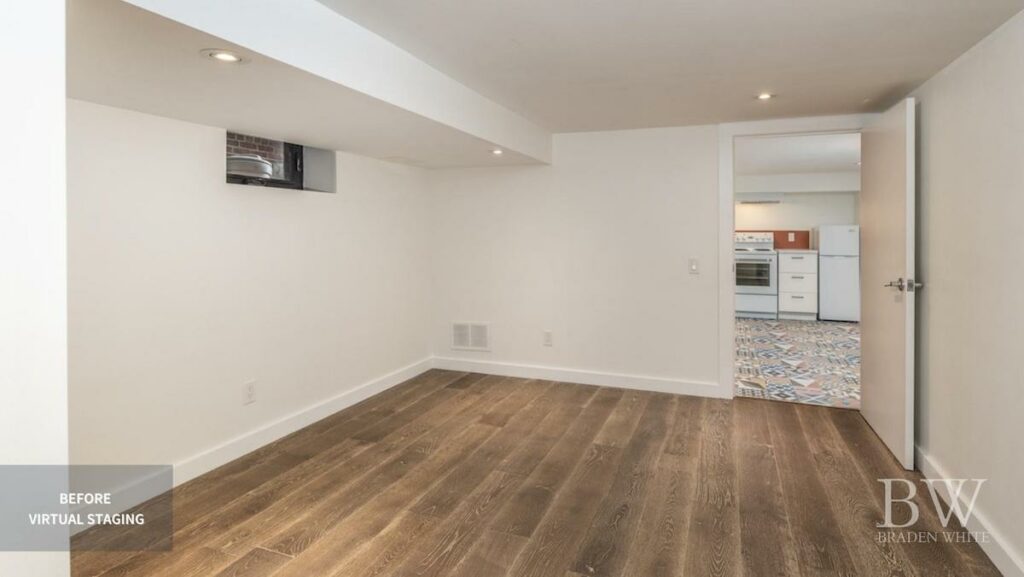

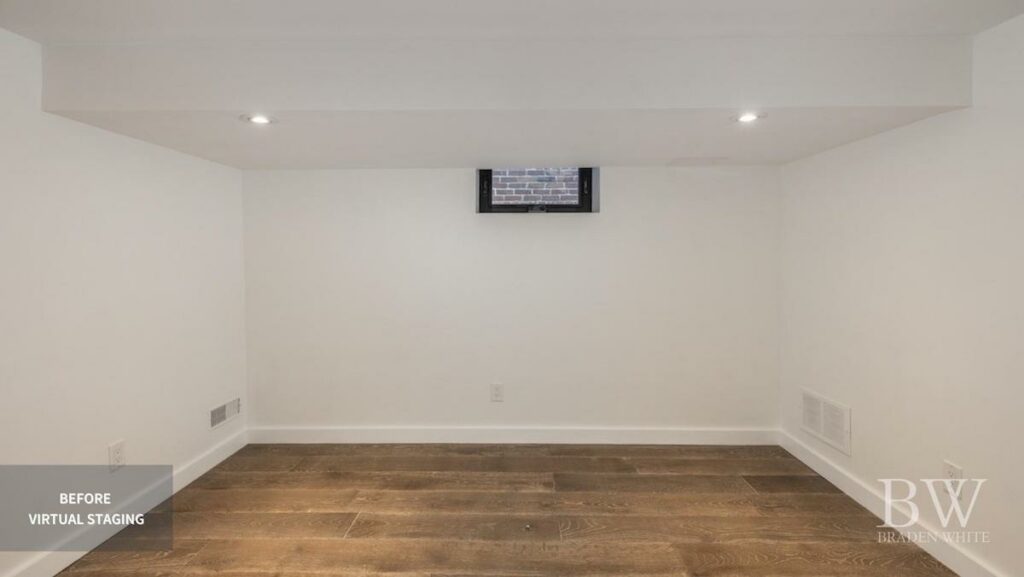

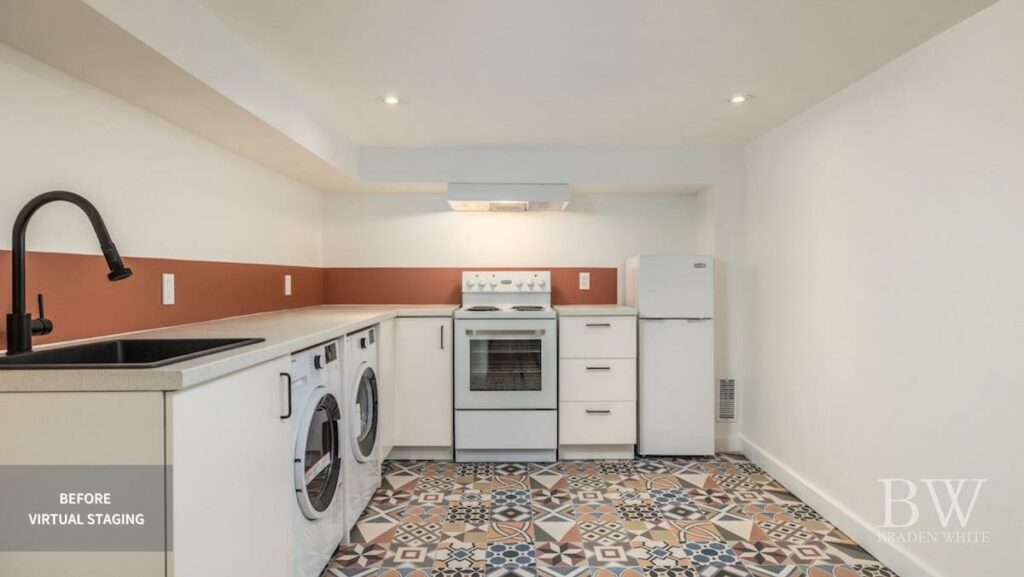

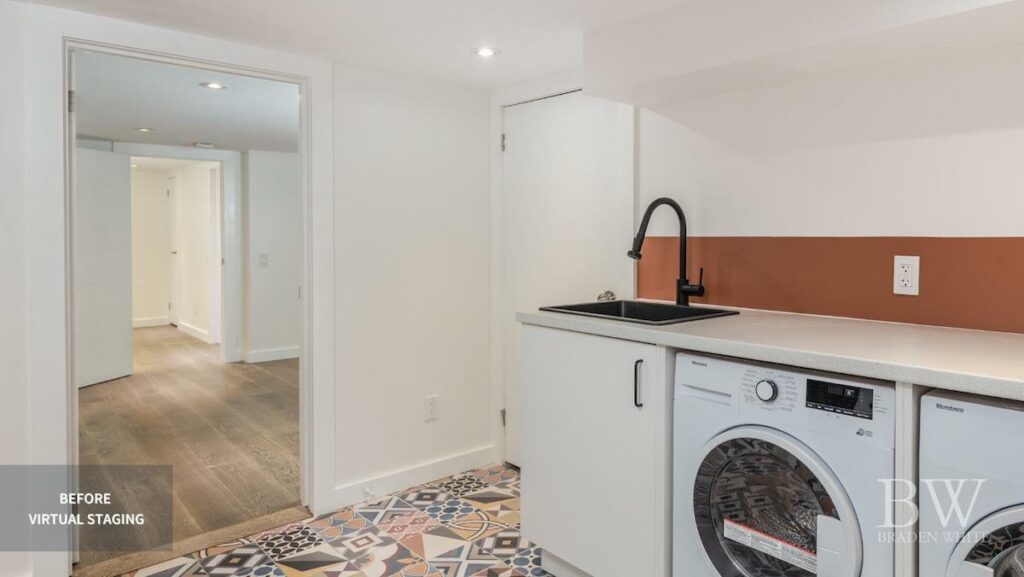
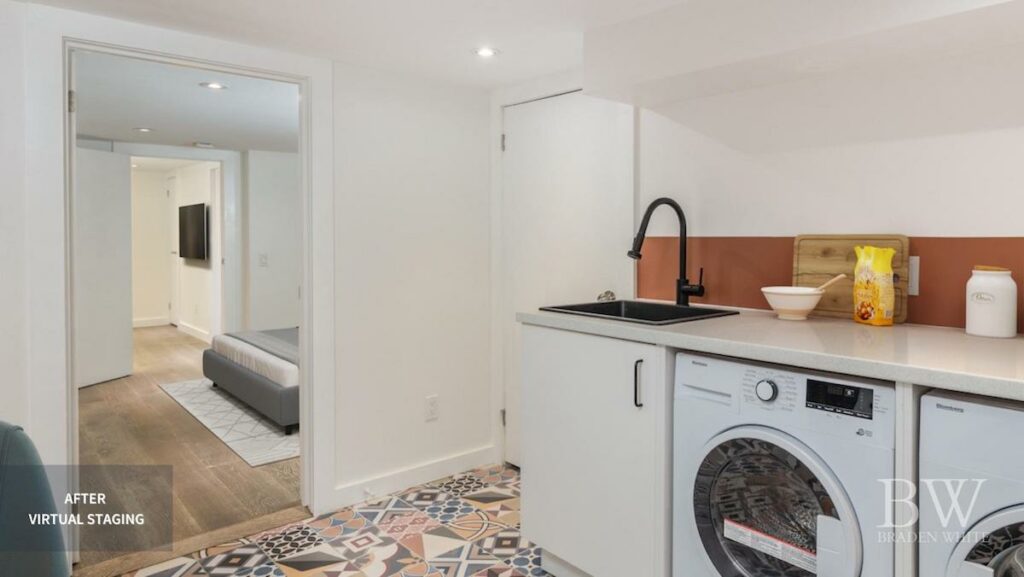
Below are additional photos of another space that my team and I virtually staged for a client.
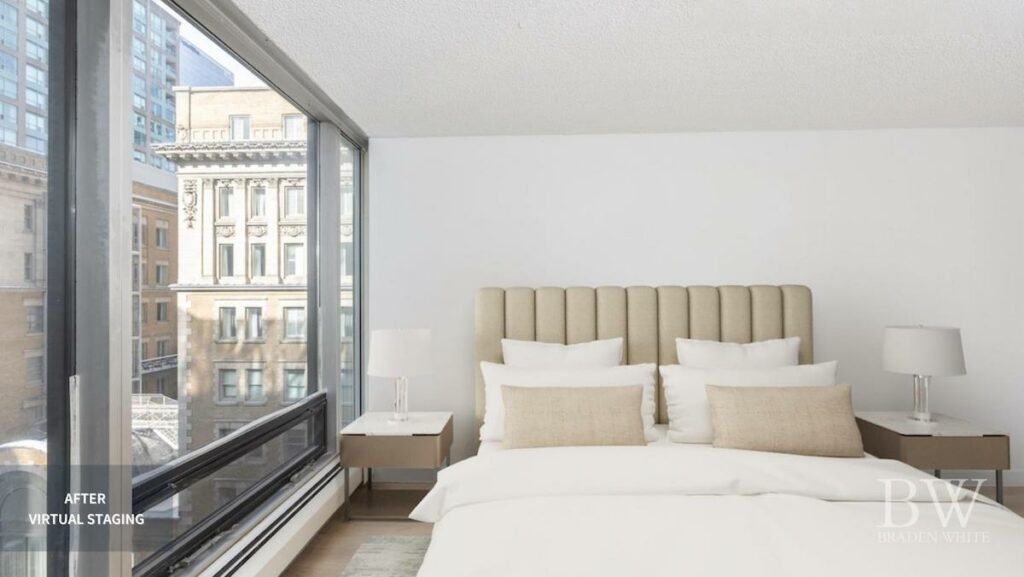
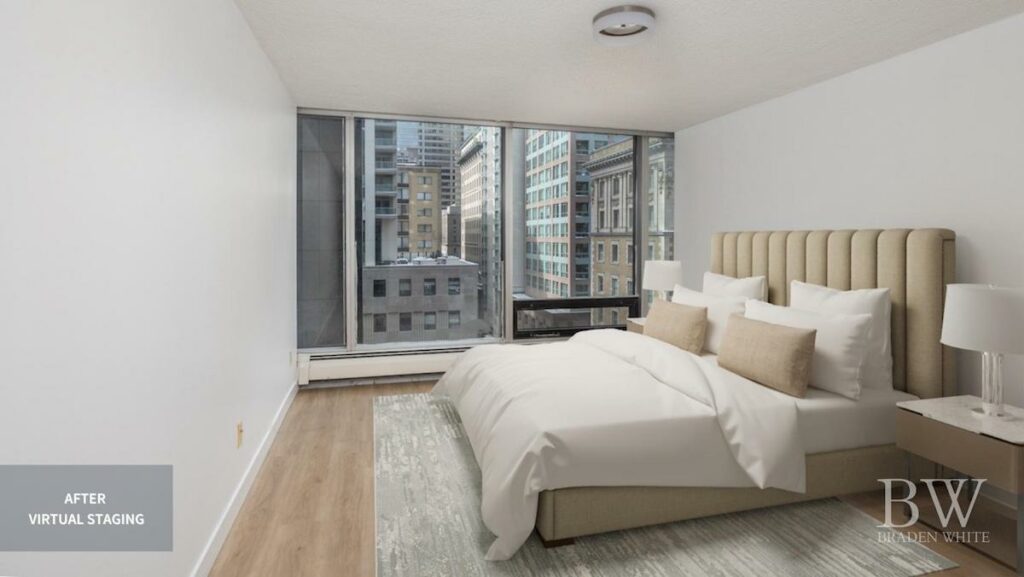





If you’re working with an experienced real estate agent who is up to date with current staging and marketing trends, they will likely be familiar with virtual staging and they should be able to explain if it’s right for your home. Either way, virtual staging is a great way to make your home more appealing to potential buyers and tenants.
Hopefully the above information was able to answer any questions you may have had about virtual staging.
Are you thinking about making a move or do you have a property that you are thinking of selling or leasing? Contact me any time with any questions you may have about the current market and how I can help you achieve your specific real estate objectives.

Understanding how to choose the right contractor can be a daunting task. You want to make sure you get the best value for your money, and that the job is done correctly.
Before starting my career in real estate, I owned a design and build company that specialized in a wide range of projects. Whether it was installing custom pools and landscaping or providing project management services for interior renovation projects in some of Toronto’s most affluent neighbourhoods, I helped many clients with turning their renovation dreams into reality. With over 15 years in the design and build industry and interviewing and hiring sub-contractors for many projects, I’ve seen it all and know what to consider and look out for when hiring a contractor.
Below are seven tips to help you choose the right contractor in Toronto for your project.

#1: Ask For Referrals From Friends, Family And Neighbours
The best way to find a good service provider is through referrals from people you know and trust. Friends, family, and neighbours are all likely to have had work done on their homes at some point, so they can give you first-hand insights into the quality of workmanship and customer service you can expect. When speaking with people who have had similar work done, ask about their overall experience and whether they would recommend the same company to others. Once you have a few referral names, take the time to do your own research by reading online reviews and checking out the company’s website. This will help you make an informed decision about which service provider is right for you.
#2 Check The Contractor’s License & Insurance
Before hiring a contractor, be sure to check their license and insurance information. This will help to ensure that they are properly qualified to do the work and that they have the financial resources to cover any damages that may occur. To check a contractor’s license, contact your local City of Toronto building department. For insurance information, ask the contractor for a certificate of insurance or contact their insurer directly. You will also want to ask for proof of WSIB. By taking these precautions, you can help to protect yourself from costly mistakes and avoid potential legal issues.

#3 Get Estimates From Several Contractors
Before you begin any home improvement project, it is important to get estimates from several contractors. This will give you a better sense of the overall cost of the project and allow you to compare prices. It is also important to ask each contractor for a list of references. This will give you an opportunity to speak with past clients and get a better sense of the contractor’s workmanship. Once you have gathered estimates and spoken with references, you will be in a better position to choose the right contractor for your project.
#4. Review The Contractor’s Work And Reviews
Before you decide on which contractor to use, meet with each contractor in person and see if you can view some of their completed work in person. This will give you a chance to ask questions and get a feel for the quality of work they provide.

#5: Make Sure The Contractor You Choose Is Clear And Concise:
A construction project can be an overwhelming task, no matter how big or small it may be. There are many factors to consider, and the last thing you want is to end up with a contractor who is not up to the job. When choosing a contractor, make sure that they are clear and concise in their communication. They should be able to explain the scope of the project and give you a realistic timeline for completion. In addition, they should be able to provide you with a detailed estimate of the costs involved. By taking the time to find a contractor who meets these criteria, you can ensure that your construction project will be completed on time and on budget.
#6 Make Sure Your Contractor Gets The Necessary Permits Before Starting The Work
Before beginning any construction project, it is essential to obtain the proper permits from your local government. Building without a permit can result in expensive fines, and in some cases, your work may need to be torn down. The permitting process can seem nerve-racking, but it is relatively straightforward if you know what to expect. In most cases, you will need to submit a set of plans to your local building department, along with a fee. Once your plans are reviewed and approved, you will be issued a permit. Make sure to check with your local building department for specific requirements in your area. Taking the time to obtain the necessary permits will help ensure that your construction project proceeds smoothly. You can begin your building permit application HERE.
In addition to avoiding delays and potential fines, obtaining the necessary permits also ensures that you do not run into any issues when selling your home. Not obtaining the necessary permits can be a costly mistake when it comes time to list your home for sale. Discover the 5 reasons why you should get a building permit HERE.
#7 Read The Contract In Detail:
Finally, be sure to review the contract carefully before signing it (including any fine print). This will help you avoid any misunderstandings or unexpected costs down the road.
By taking the above precautions, you can be sure that you’re hiring a reputable contractor who will hopefully do a great job and provide you with good service.
Are you thinking about making a move and have question about the current market or what renovation projects will add the most value to your home? Contact me any time with your questions or to book a free consultation to learn what renovations will add the most value to your home.

In September 5,038 residential properties were reported sold in the greater Toronto area. This is the lowest number of recorded sales for September since 2001 when only 5,021 properties were sold. This data is even more dramatic and the decline is more striking when correlated to the greater Toronto area’s population. In 2001 Toronto’s population was almost 4.7 million people. Currently, it is approaching 6.4 million.
There is no mystery as to why sales have decreased so dramatically. In March of this year 10,871 properties were reported sold. This was not a monthly record. The record for monthly sales is March 2021, when 15,627 sales were recorded. The decline in sales can be directly attributed to the rise in the Bank of Canada’s benchmark rate. In early March it was 0.25 percent. It’s now 3.25 percent and expected to rise once again by the end of October when the Bank provides its analysis of the economy and its views on inflation.
The basic market data for September is set out in the chart below.
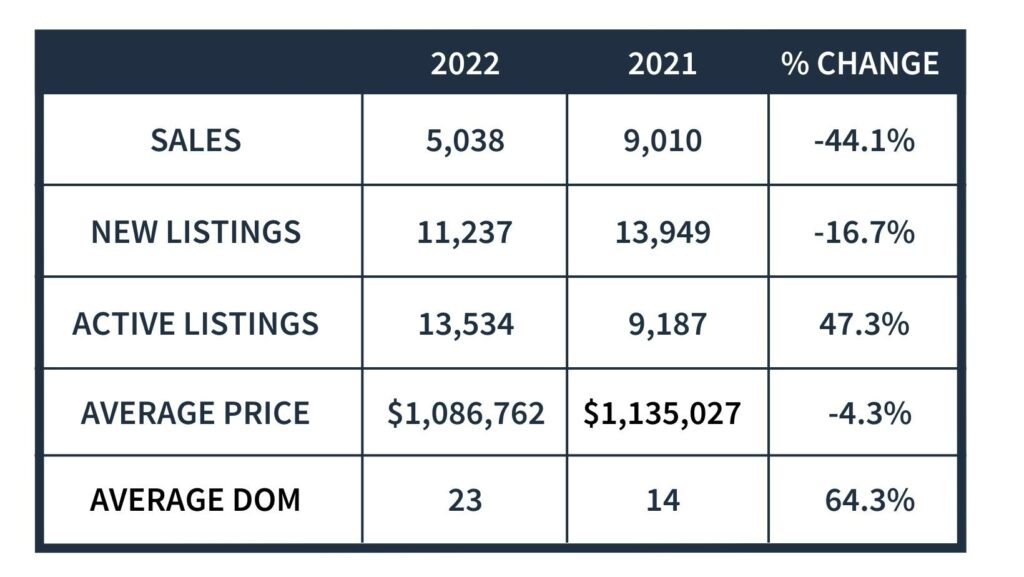
As mortgage interest rates have continued to increase, more than double since March, sales and average sales prices have declined. Current 5 year fixed mortgage interest rates hover around 5.5 percent. Potential buyers however must qualify at 7.5 percent when mortgage stress testing is applied. The increase in mortgage interest rates have effectively made housing even less affordable than it was in February of this year when the average sale price for all properties sold in the greater Toronto area was $1,334,093, almost 20 percent higher than it is today.
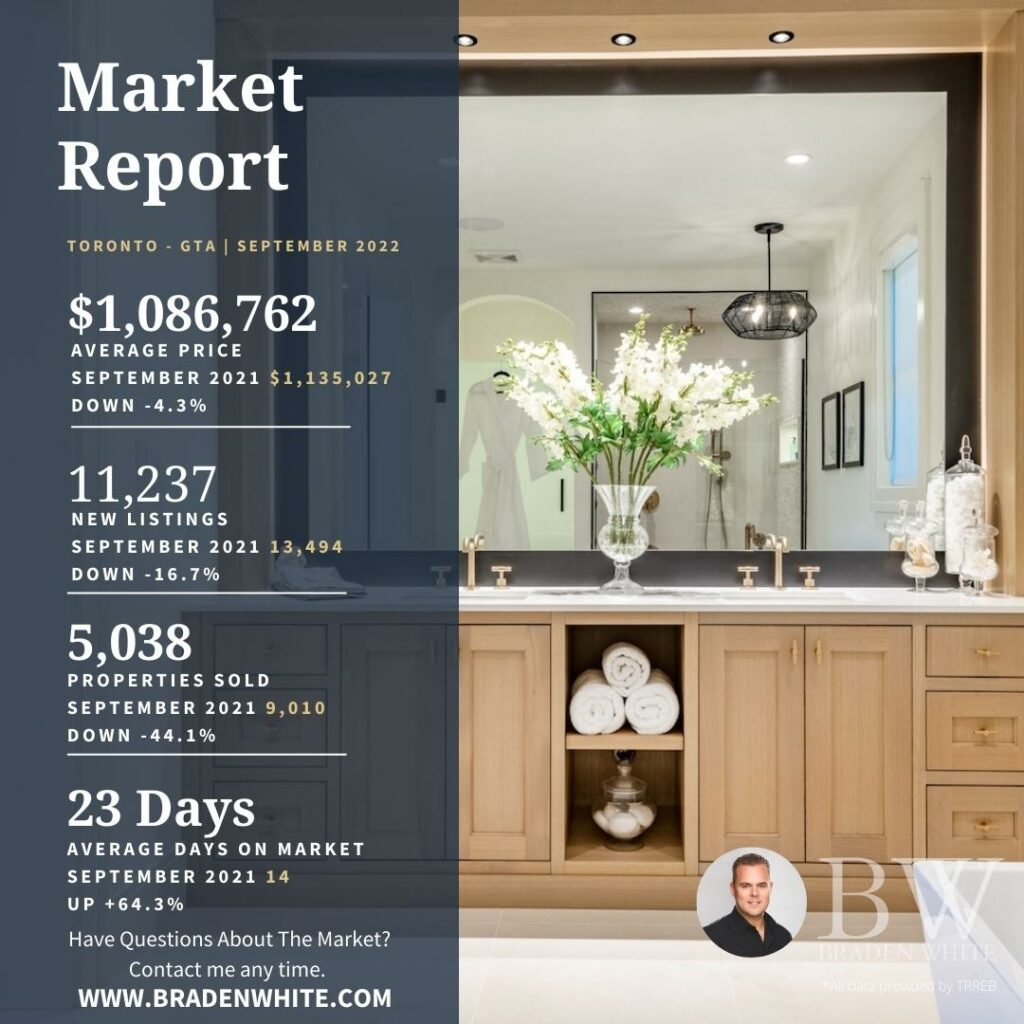
The decline in average sale prices is, except for condominium apartment sales, universal. Both in the City of Toronto and in the 905 region, prices for detached, semi-detached, and townhomes decreased on a year-over-year basis. Condominium apartment sales prices, the least expensive housing in the greater Toronto area, increased by 3.4 percent in the City of Toronto and by 3.3 percent in the 905 region. In central Toronto, where most of the greater Toronto area’s condominium apartments are located, the average sale price came in at $827,478. Notwithstanding the overall decline in average sale prices over the last six months, the least expensive housing form in the greater Toronto area has not become less expensive.
Sales prices are now consistently lower than asking prices. That’s because buyers have more choices and multiple offer competitions are the exception and not the norm as they were during the height of the pandemic. In September the average sale price compared to the average list price was 98 percent. In February and March, all properties sold (on average) for more than 110 percent of the asking price.
The only trading area that is bucking this trend is, once again, Toronto’s eastern districts. In September, all properties reported sold in Toronto’s eastern districts sold for 101 percent of their asking price and in only 19 days. Semi-detached properties sold for 104 percent of their asking price and in only 13 days. Multiple offer competitions are not unusual in the eastern districts, especially Riverdale, Leslieville, and the Beach, although they are nowhere near as frequent as they were prior to March of this year.
Unfortunately, there are no signs of relief for the rest of the resale housing market in the near future, although it does appear that average sale prices have stabilized and have even risen since July. At the beginning of September average sale prices in the City of Toronto were slightly over $1 Million. At the end of September, they were hovering around $1,080,000. Based on public statements made by the Bank of Canada in its crusade to reduce inflation, a further increase in the benchmark rate is expected in late October. The consistently increasing rates have had a negative financial and psychological impact on buyers. Consequently, we can expect a continuation of September’s market trend right through to the end of 2022.
Have questions about the market, selling or buying?
Contact me any time. I’m happy to answer any questions you may have.
Prepared by Chris Kapches, LLB, President and CEO, Broker, Chestnut Park® Real Estate Limited, Brokerage.

The mornings are brisk, the leaves have started changing to beautiful vibrant colours and we begin to see our breath. It’s hard to believe but it’s that time of year again, the time to look over your fall home maintenance checklist. Below is a list of items you will want to consider addressing this fall before the temperature gets too cold. Not only are the items in this list below important for general home maintenance, they are also important to consider if you have any plans of selling your home in the near future as ignoring them could reduce the value of your home.
Clean And Pack Away All Af Your Patio Furniture Cushions – Before the temperatures get too cold, spray down your patio furniture cushions and let them dry out in the sun before storing them for the winter. If you wait too late into the fall or early winter to do this, your cushions won’t dry.
Store Or Wrap Your Outdoor Furniture – If you don’t have any indoor space to store your outdoor furniture, consider wrapping your furniture in order to protect it from the ice and snow. This is especially important for any metal furniture as the moisture from the ice and snow will potentially cause it to rust.
Deadhead And Prune Your Gardens – It is best to deadhead and cut back and prune the plants and trees in your garden that require this type of care in the fall. Don’t forget to check your local garbage schedule HERE to see which days collect compostable garden waste bags.

Aerate, Overseed & Fertilize Your Lawns – Aerating, overseeding and fertilizing your lawn in the fall will help it look its best in the spring. This is very easy to do on your own if you are comfortable with using simple hand tools. You can also hire a company to provide this service.
Clean Your Eavestroughs & Downspouts – This is extremely important as you don’t want to experience any water or ice damage during the winter months due to clogged eavestroughs and downspouts. You may want to try contacting Sunnyside Window & Eaves Cleaning if you live in the east end of the city such as The Beaches, Upper Beaches, Birchcliff, East York, Danforth Village, Leslieville or Riverdale.
Test Your Sump Pump – If you have a sump pump, it is important that you test it before the winter to ensure that everything is running properly in order to avoid basement flooding which can happen when snow thaws during the winter months and in the early spring. If you don’t already have one, you may want to consider installing one as the cost of installing a sump pump definitely outweighs the costs and inconvenience that comes along with a potential flood in your basement. In addition to having a sump pump, it is best to also have a back-up battery connected to it so that your sump pump is always ready to do its job even if your power goes out.
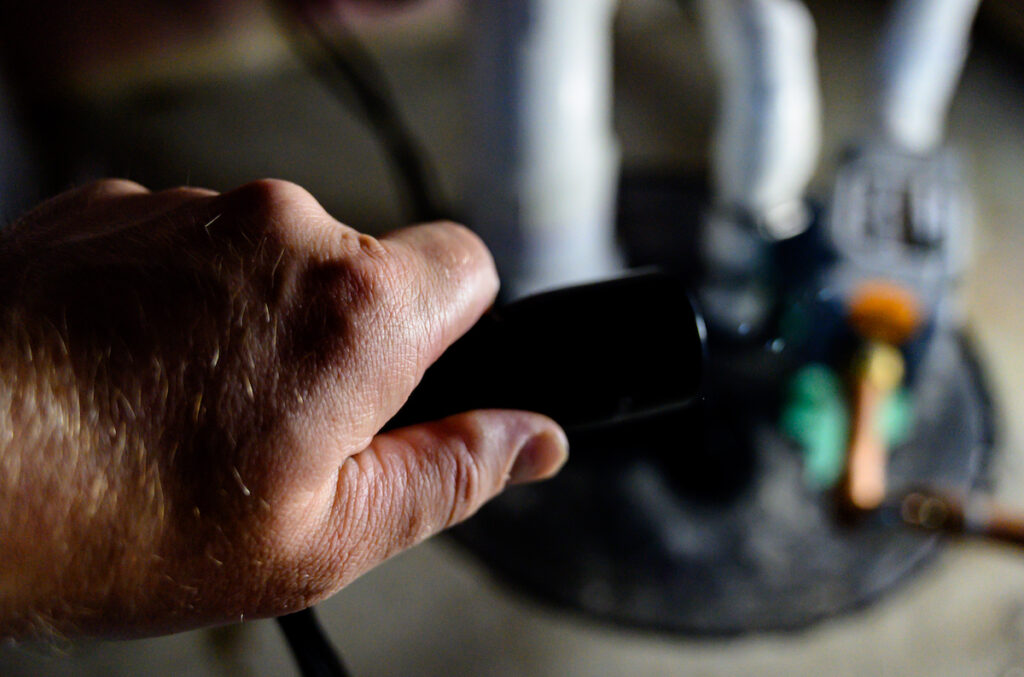
Get A Check Up On Your Heating System – This may be too obvious to have on a fall home maintenance checklist, but I’ve included it just in case you haven’t thought of it. With the freezing cold winter months coming, the last thing you want is for your heating system to break down. Hire an HVAC company in the fall to complete a check up on your system to ensure that everything is in good working order.
Cover Your Air Conditioner – Cover your air conditioner with a waterproof cover to avoid any ice getting into it and damaging it. This will also keep out other unwanted items like leaves, twigs and branches which could potentially damage your air conditioner.
Change Your Furnace Filter – Since you are going to be spending more time inside over the winter months, it’s essential that you are breathing clean air. Many people forget to change their furnace filter on a regular basis which can not only lead to an unhealthy living environment but also potentially cause damage to your heating system which is very expensive to replace. It’s recommended that you change your air filter every 90 days. In addition to changing your air filter, you may also want to consider upgrading your air filter to a higher grade.
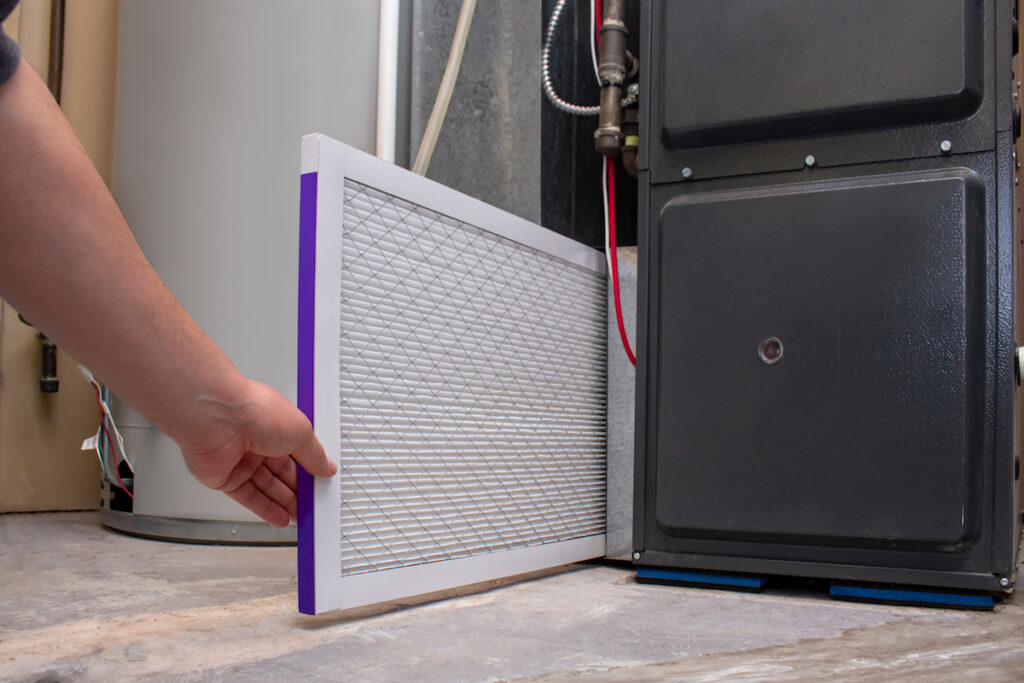
Check Your Fire And Carbon Monoxide Alarms – With the use of fireplaces and other heating systems during the winter months, it’s important to test your fire and carbon monoxide alarms and to have any glitches addressed immediately. If you have independent alarms that run on batteries, make sure you switch out the batteries with new ones in the fall to ensure that they work if needed.
Get A Checkup On Your Fireplace – Whether you have a gas fireplace or a wood burning fireplace, it is important to ensure both are in good working order and are safe to use this fall and coming winter. If you have a wood burning fireplace, it is important that you use a WETT certified inspector to inspect your chimney and fireplace. Most gas fireplace companies have their own inspectors that will inspect your fireplace to ensure that it is safe to use.
Clean Your Windows – Fall is a great time to clean your windows before it gets too cold in the winter. You may want to try contacting Sunnyside Window & Eaves Cleaning if you live in the east end of the city such as The Beaches, Upper Beaches, Birchcliff, East York, Danforth Village, Leslieville or Riverdale.

Declutter Your Summer Items – Many homes in the east end of the city such as The Beaches, Upper Beaches, East York and Leslieville are quite small and don’t have front hall closets. Fall is a good time to move your summer belongings into storage.
Turn Off Your Outdoor Hose Bibs – This is an important one to include in your home maintenance checklist. It is extremely important that you either turn off all of your outdoor hose bibs or replace them with non-freeze hose bibs in order to avoid any flooding due to freezing pipes.
Drain garden hoses – Drain any garden hoses you may have and store them indoors. If you leave water in your hose, it can freeze and expand to the point that it damages your hose.

Blow out irrigation pipes – This is a very important step if you have an irrigation system. If you neglect to do this, you could be looking at costly repairs to your irrigation system.
Prepare Gas Operated Equipment For The Winter Storage – Remove any remaining fuel or add fuel stabilizer to any gas powered equipment. This will ensure that your equipment will start properly in the spring and keep your equipment in good working order.
Test And Tune Up Your Snowblower If You Have One – Don’t wait until the biggest snowfall of the year to test your snowblower. Make sure everything is running properly before the first snowfall to avoid any issues.
Although it may seem like a lot to tackle, most of these items are essential to address prior to the winter months. What seems like a bit of a hassle now will definitely pay off over the winter. Save this list as your fall home maintenance checklist for years to come.
Are you thinking about making a move or have questions about the current market or buying and selling processes? Contact me any time with your questions, I’m always happy to help.

Are you feeling overwhelmed by the clutter in your home? If so, you’re not alone. Clutter can be more than just an eyesore. It can actually make you feel stressed and overwhelmed, leading to decreased productivity and even health problems. If you’re looking for ways to declutter your home, check out these 10 tips!
1. Purge your home of unnecessary items – Start by going through your home room by room and getting rid of anything you no longer need or use. This can be a difficult task, but it’s important to be honest with yourself about what you really need and don’t need.
2. Store food in sealed jars – One way to gain additional cupboard and counter space in your kitchen is by storing certain foods in sealed jars instead of leaving them in the bags and boxes that they come packaged in. This will allow you to keep your kitchen more organized. Foods to consider storing in jars include pasta, rice, oats, cookies etc.

3. Create a donation pile for things you no longer want or need – If you have items that are in good condition but you no longer want or need them, consider donating them to a local charity. This is a great way to declutter your home and help others in the process.
4. Set aside a space for things you want to sell – If you have items that are still in good condition and are valuable but you no longer want or need them, consider selling them. This is a great way to declutter your home and make some extra money in the process.

5. Pack away seasonal items to free up storage space – If you have seasonal items that you only use a few times a year, consider packing them away until you need them. This will declutter your home and give you more storage space.
6. Organize the remaining items in your home – Once you’ve decluttered your home, it’s important to organize the remaining items. This will help you keep your home decluttered and make it easier to find things when you need them.
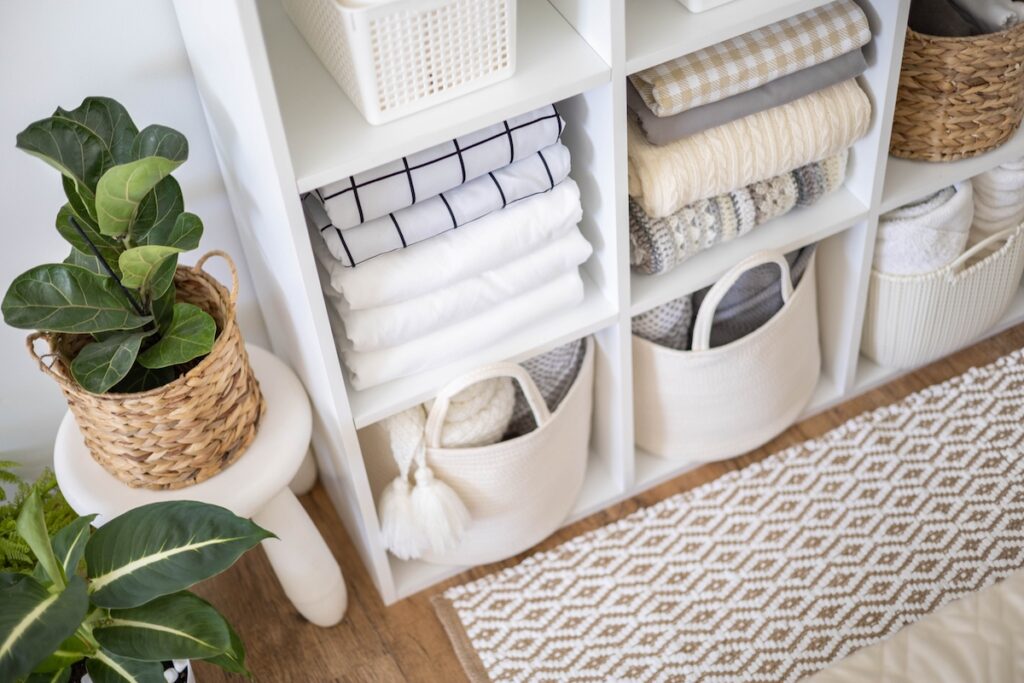
7. Find creative ways to store unused items – If you have items that you don’t use often but can’t bear to get rid of, find creative ways to store them. This will declutter your home and give you peace of mind knowing that your belongings are safe. If you have a garage, maybe you can add shelving to provide additional storage space, if you have room in your yard, building a shed can be a good option as well. Alternatively, you can rent storage unit.
8. Make a plan to keep your home decluttered in the future – Once you’ve decluttered your home, it’s important to make a plan to keep it that way. This may require you to change your habits or the way you organize your belongings. But, if you make a plan and stick to it, you can keep your home decluttered for good.

9. Get help from friends, family members or a service if needed – If you’re struggling to declutter your home on your own, ask for help from friends and family members. They can offer support and advice on how to declutter your home. If you don’t have any friends or family that may be helpful with this subject, you may want to consider hiring a decluttering service to help you organize your home.
10. Celebrate your accomplishments – Once you’ve decluttered your home, take a moment to celebrate your accomplishment! This is a big task and it’s important to congratulate yourself on a job well done.
Decluttering your home will not only provide you and your family with a healthier living space it will also make certain daily household chores such as cleaning easier. For all you parents out there, as a parent myself of two little ones, I understand how hard it can be to keep things organized. You may not be able to keep your home in a picture perfect state on a daily basis but decluttering will provide you with additional space to store certain items such as toys out of the way so you no longer need to worry about stepping on them.
Hopefully the above tips have been helpful to you and have given you some ideas as to how you can declutter your home.
Are you thinking of making a move or have questions about the current Toronto real estate market? Contact me any time with your questions, I’m always happy to help.

Understanding the difference between appraised value vs market value is extremely important when buying and selling real estate in Toronto. With rising interest rates and the market shifting (as of the time this blog post is being written), we are now seeing more appraisals being required by lenders. If you are buying a home or condo in Toronto and your lender requires an appraisal but you didn’t include a financing clause, you better hope that the appraisal comes in close to the amount you have offered, I will explain in further detail later.
The first thing to understand is the difference between appraised value vs market value. I’ve included a description of each type of value below in order to help you understand the difference.

What is An Appraisal and Appraised Value:
The appraisal/appraised value of a home is based on the opinion of a professional appraiser. Your lender may require an official appraisal to ensure that they don’t lend you more than the property is worth. Should your lender require an appraisal for a property you have purchased, the appraiser will likely arrange a time to visit the property in order to complete the appraisal. During the visit, the appraiser will take measurements, make notes and may ask questions about the property such as the age of the home, age of certain aspects of the home such as the roof, electrical system, HVAC system etc. The appraised value is the value that the appraiser determines based on their calculation. It’s common for the appraised value to come in lower than the market value (how much the home could potentially sell for when listed for sale). Should you receive an appraisal that you feel is unrealistic, you should request a second opinion. I once helped clients with the purchase of a home which required an appraisal and the appraised value came in at an amount that just didn’t make sense. We requested a second appraisal which came in at $150,000 more than the original one. Lesson learned, don’t always accept the first appraisal if you feel something is off.
It was less common for lenders to request appraisals prior to the pandemic and the recent interest rate increases when the Toronto real estate market was rising month after month with no sign of any change on the horizon. The pandemic and recently increased rates has changed that as we are now seeing more appraisals.
Appraisals are not only used for every day home purchases but also for other purposes as well. Below are some of the reasons why a home appraisal may be needed:
What if Your Appraisal Comes In Low:
When buying a home in a market that is experiencing an increased number of appraisals, it is important to avoid overpaying for a property as you could find yourself in a costly dilemma. Should you over pay for a property and your appraisal come in substantially lower than what you offered on the property, you could be required to pay the difference. As an example, if you purchased a home for $1,200,000 but the appraisal comes in at $1,000,000, you could be required to come up with $200,000 to make up the difference out of pocket.

What is Market Value:
The market value of a property is determined by how much buyers are willing to pay for a property. The market value of your home will fluctuate based on the condition of your local real estate market. During a seller’s market (more demand than available supply), the market value of your home will likely rise. In addition to a lack of supply, if rates are considerably low, this will create more demand and drive up the market value even more. Conversely, if rates are high and supply outweighs demand, the market value of your home will decrease. Regardless of which state your current local real estate market is in, there are ways to increase the value of your home which you can view HERE.
Hopefully the above information has been able to answer any questions you may have had about appraised values vs market values. Feel free to contact me should you have any additional questions that weren’t answered above.
Are you thinking about making a move or have questions about the current market? Contact me any time, I’m always happy to answer your questions.

If you are fortunate enough to live in Toronto’s Distillery District or if you frequently visit this popular neighbourhood, you may have noticed some new developments taking place in the area and you may have wondered what is being built.
As a full-time Toronto real estate agent who works in Toronto’s Distillery District and who has several clients who live in the Distillery District, I figured it would be helpful to provide some information as to what is currently being built as well as what may be built in the near future. Whether you live in 70 Distillery Lane, 390 Cherry Street, 33, 70 or 80 Mill Street and are wondering how these developments may soon affect your view and community or you are looking to purchase a property in the area and are curious as to what the area will have to offer in the near future, the information below may be helpful to know. Below is a list of the current developments that are already under construction as well as other developments that are in the pre-construction phase.
Currently Under Construction:
At the south-west corner of the Distillery District, you will find a pie-shaped lot located at 31 Parliament Street. What was once strictly a commercial space not being used to its full potential, will soon become a 41 storey mixed-use building. This development will add 428 residential condominium units to the neighbourhood along with additional retail space.
Developer: Lanterra Developments & Westdale Properties
Project address: 31 Parliament Street, Toronto
Learn more about this development and view additional photos HERE
Photos:
Just to the north of the No. 31 Condos will be Good Condos which will be a 32 storey mixed-use building that will include both residential condos as well as retail space. This project will add an additional 540 new condo units to the Distillery District neighbourhood.
Developer: Graywood Developments
Project Address: 33 Parliament Street, Toronto
Learn more about this development and view additional photos HERE
Photos:
West Don Lands Block 3, 4 & 7
On the north-west corner of Cherry Street and Mill Street you will soon find a 13, 13 and 13 storey affordable rental and commercial/retail building. This project will add an additional 855 residential condo units to the Distillery District neighbourhood.
Developer: Dream Unlimited, Kilmer Group & Tricon Residential
Project address: 90 Mill Street, Toronto
Completion date: To be determined
Photos:
Pre-Construction Phase:
60 Mill Street
60 Mill Street, located on the northeast corner of Mill Street and Trinity Street, could soon become the first hotel in Toronto’s Distillery District neighbourhood. The developer Gupta Group has proposed to build a 31 storey hotel that will include 392 hotel suites. Gupta Group plans to revitalize the existing Rack House that currently stands on the property in order to maintain the historical character on the street level.
Developer: Gupta Group
Project address: 60 Mill Street, Toronto, ON, M5A 3R6
Completion: To be determined
Learn more about this development and view additional photos HERE
31R Parliament Street
At the rear of the new condo building being constructed at 31 Parliament (No. 31 Condos) is proposed to be a 49 storey mixed-use building along with a low-rise 4 storey “ribbon building”. This project will include both residential condominiums and commercial office space.
Developers: Cityscape Development Corp & Dream Unlimited
Completion: To be determined
Project address: 31 Parliament Street, Toronto, ON, M5A 4R2
Additional Development Info
West Don Lands Block 20
Although this property technically isn’t situated in the Distillery District, this development will affect the views of those who currently live on the east side of both 390 Cherry Street and 70 Distillery Lane. This development is currently in the construction phase and, once completed, will include 46 & 32 mixed-use buildings that will include residential market-rate rental condos, commercial office and retail space as well as park space.
Developers: Dream Unlimited, Kilmer Group & Tricon Residential
Completion date: To be determined
Project address: 125R Mill Street, Toronto, ON
With so much development taking place in the Distillery District, this area is sure to become an even better neighbourhood than it already is.
Are you looking to make a move to or from the Distillery District?
As a local full-time Distillery District real estate agent who has assisted clients with both buying and selling condos in the area, I know the Distillery District neighbourhood and condo buildings extremely well. Whether you are looking to make a move now or in the future or you simply have questions about real estate in the Distillery District, feel free contact me any time. I’m happy to answer any questions you may have and to discuss how I can help you achieve your specific Distillery District real estate objectives.

If you live in The Beaches, you are likely well aware that it is a very pet friendly community. During all months of the year, residents walk their dogs along Queen Street East, through Glen Stewart Ravine and along the boardwalk. You yourself may even be one of these furry friend lovers who enjoys taking your dog for a walk in this beautiful community. If you are reading this blog post, it’s likely that you may be looking for pet stores in The Beaches. I’ve put together this post in order to help local residents of The Beaches find what they are looking for when they are in need of pet supplies.
If you’re looking for pet supplies such as pet toys, pet food or other pet related items, there are several pet stores in the area and nearby, each with its own unique selection of supplies. So whether you’re looking for items for your dog, cat, bird or even something more exotic, you’ll likely be able to find it at one the stores listed below in and near The Beaches.
The Dog Market located at 2116 Queen Street East, Toronto, M4E 1E2.
They have a wide selection of dog related products including:
For Dogs
For Cats
You can contact The Dog Market at 416-699,1313 or visit their website at thedogmarket.ca
Pet Valu locations located in The Beaches area. One located at 1656 Queen Street East, Toronto, M4L 1G5 and another located at 2210 Queen Street East, Toronto, M4E 1E7.
Pet Valu carries a wide selection of pet supplies and provides various services including:
You can contact the 1656 Queen Street East location at 416-694-8176 or visit their website at store.petvalu.ca/location/2332/
You can contact the 2210 Queen Street East location at 416-693-4456 or visit their website at store.petvalu.ca/location/2167
Global Pet Foods located at 1747 Queen Street East, Toronto, M4L 3Y4
Global Pet Foods is a popular pet store which carries a wide range of pet supplies for a variety of pets including:
Some of the supplies they carry are the following:
You can contact Global Pet Foods at 416-686-9468 or visit their website at beaches.globalpetfoods.com/product/shop/
The DOGSPAWS located at 1089 Kingston Rd Unit 8, Scarborough, M1N 4E4
The DOGSPAWS is a popular pet grooming location for those who live in The Beaches and the surrounding area. You can contact them for pricing and to book an appointment at 416-691-7778 or by visiting their website at thedogspaws.ca/pages/contact
Paws’ World is located at 763 B Woodbine Ave, Toronto, M4E
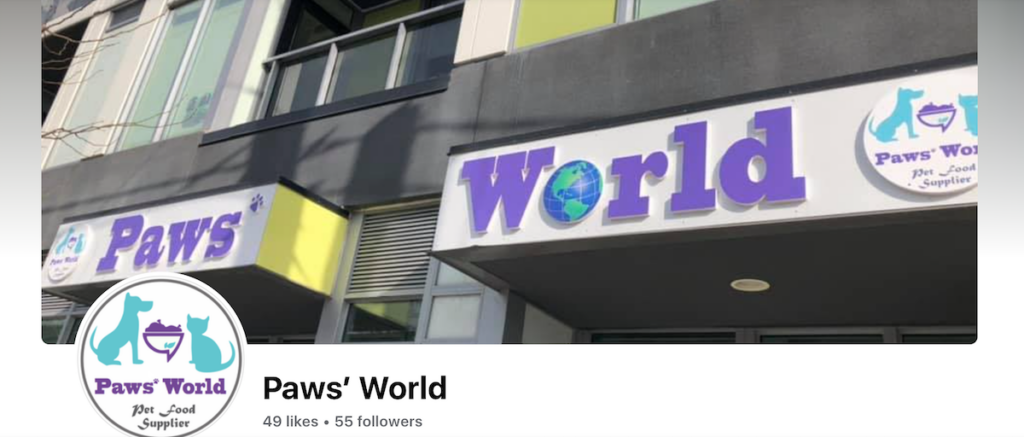
For those who live in the Upper Beaches, Paws’ World carries a wide selection of pet foods as well as pet supplies. You can contact them at 416-686-9030 or visit their Facebook page.
Hopefully the above list of pet stores in The Beaches has been helpful and you find what you are looking for.
If you are considering a move and are looking to buy the perfect home for a perfect home for you and your furry little one, contact me any time with any questions you may have. I’m always happy to help.

If you’ve considered buying a condo and have completed some preliminary research regarding the process of buying a condo, you may have come across the term “status certificate” and wondered what a status certificate is. If you decide to purchase a condo, you definitely should understand what a status certificate is and why it is important to review the status certificate of your building of interest either before submitting an offer or before waiving a status certificate condition (we will discuss this in detail below).
I’ve helped many sellers and buyers with the sale and purchase of condos throughout Toronto. Many of my first-time buyer clients are unaware of what a status certificate is, so don’t feel like you are the odd one out for not knowing. To answer your questions about what a status certificate is and why it is important, I have included the information below to explain what is included within this document, the importance of reviewing a status certificate, how to order a status certificate and risks associated with not reviewing a status certificate.

What’s Included In A Status Certificate
A status certificate includes a variety of important details relating to the building and condo corporation. You can think of this document as a report card for the building and condo corp; some buildings have better report cards than others depending on how they were built and how they are managed and maintained. Some of the information you will find in a status certificate include:
A reserve fund is a pool of money that is accumulated over time from a portion of the monthly maintenance fees that the owners pay. This fund is used to repair and replace different components within the interior and exterior of the building and throughout the entire property. Should there ever be any major repairs needed, the reserve fund is in place to assist with covering the repair or replacement costs. A poorly managed reserve fund can result in maintenance fee increases and potentially a special assessment which could require you and all of the other owners in your building to pay a large lump sum out of pocket to cover repairs or replacement costs that the reserve fund is unable to cover.
As explained above, a special assessment is an additional payment or levy the condo corporation has to impose should there not be enough funds available in the reserve fund to cover budget related items or repair and replacement costs.
This will typically include any information relating to any upcoming increases and whether or not the current owner has defaulted on their payments.
This will include details relating to the agreement your condo corporation has with the current property management company.
This will include details regarding what coverage your condo building has.
The minutes is a document which includes all of the important decisions made by the co-owners during the general meeting.
A reserve fund study determines how much money needs to be in the reserve fun in order to ensure that future repairs can be completed.

Why It’s Important To Review The Status Certificate When Buying And Before Selling
When Buying:
When buying a condo, it is essential that you have the status certificate reviewed by a reputable real estate lawyer. A good real estate lawyer will complete an in-depth review of the documents and will provide you with a breakdown of the status certificate details and highlight any red flags that you should be aware of. Without reviewing the status, you could potentially find yourself in a serious financial dilemma if the status states that there have been any special assessments, the reserve fund is under funded, there are maintenance fee increases on the horizon or if the condo corporation is involved in any litigation. Having a lawyer review the document will help you make your purchase with confidence.
When Selling:
When selling your condo, it is wise to review the current status certificate (for the current month) in order to familiarize yourself with the info within it. This is helpful in case there are any big items that may be brought up by buyers as negotiating tools. Some buyers will try to negotiate down from their original offer price if they submit an offer that’s conditional on the review of the status certificate and find details that make them uncomfortable. By reading your certificate before listing your condo for sale, you will be able to prepare for any issues that may be brought up by the buyer or their lawyer. An experienced real estate agent will be able to assist you with planning for potential hiccups that could arise from any problematic details within your status certificate.

How To Order A Status Certificate In Toronto
There are a few different ways to order a status certificate here in Toronto. The three most common ways to order are listed below:
Through the CONDUIT website which you can visit by clicking HERE
Through the CondoCafe website which you can visit by clicking HERE
If you are unable to find the condo address and status certificate at one of the two websites above, you may need to request the status certificate directly from the property management company. Below is a list of some of the common property management companies that provide management services throughout Toronto. The list is not inclusive of every single management company.
Crossbridge Condominium Services
Mapleridge Community Management
If you still aren’t able to obtain a copy of the status certificate through one of the options listed above or can’t determine which management company services your building of interest, you can go directly to the property of interest and ask the concierge to confirm which company manages the building and ask for the contact info of the property manager.
The Risk Of Buying A Property Without Reviewing The Status Certificate
There are many potential risks which could result from not reviewing a status certificate. Below are just some of the risks you could run into and want to consider:
Hopefully the above information has been helpful to you and has answered some questions you may have had about status certificates.
Are you thinking about buying or selling or do you have questions about the current market? Contact me any time with your questions or to discuss how I can help you achieve your specific real estate objectives.